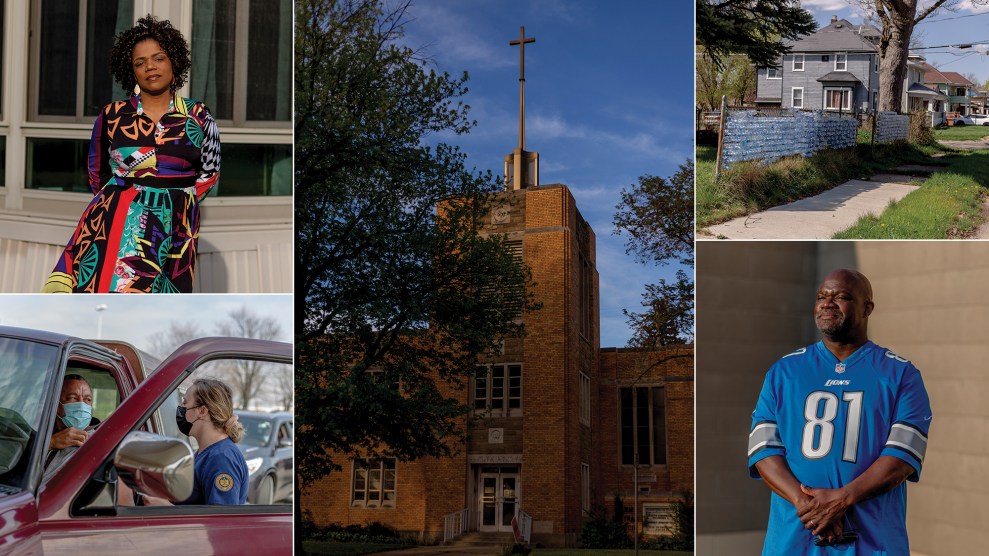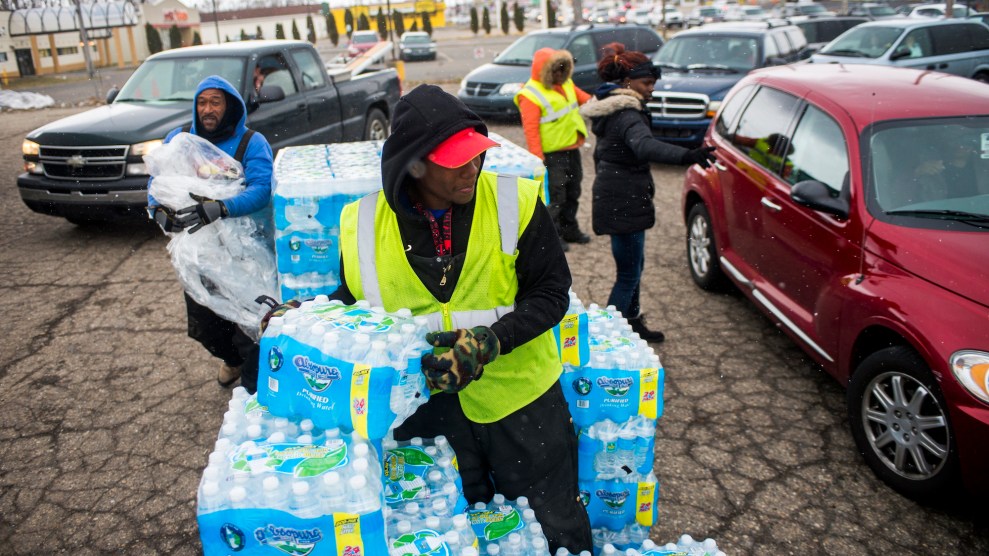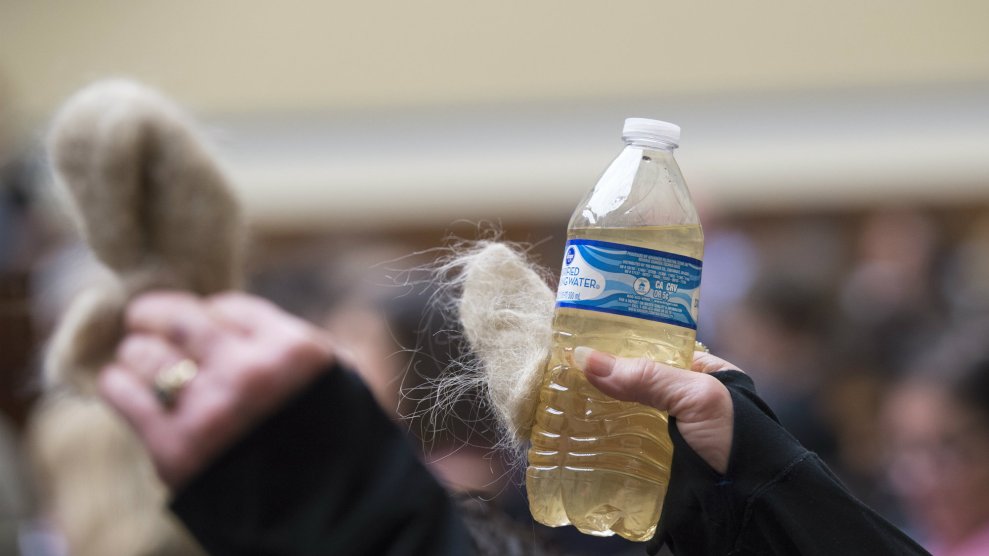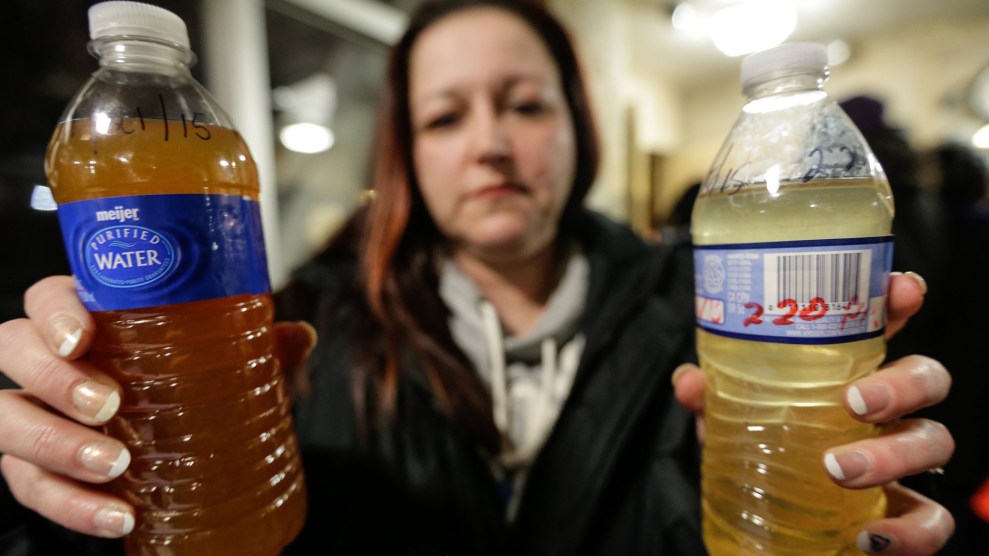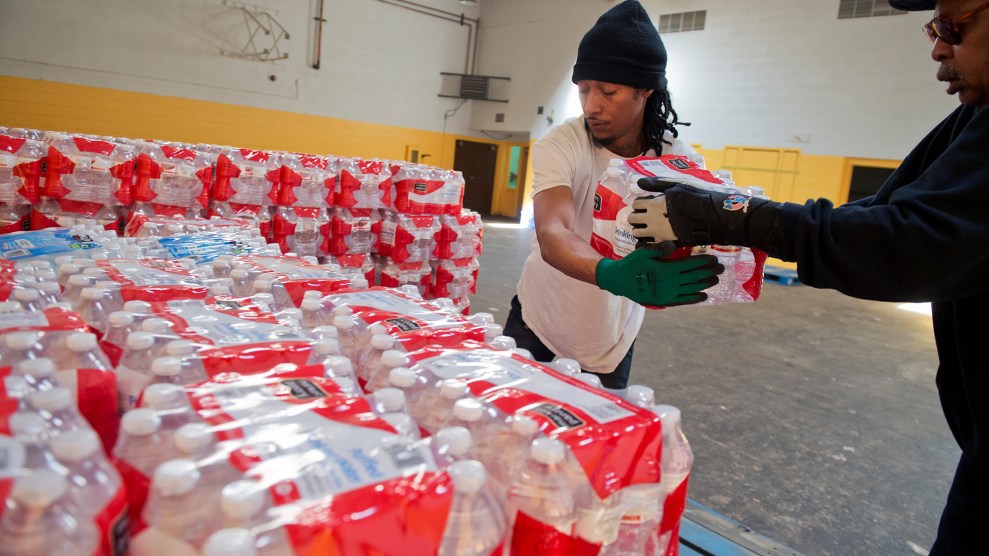
Randall Hopskon, Jr., left, and Bennie Thornton stock bottled water in the basement of the St. Mark Baptist Church in Flint, Mich., February 23, 2016.Tom Williams/AP
This story was originally published by the Guardian and is reproduced here as part of the Climate Desk collaboration.
Sharply mixed reactions have greeted the award by a federal judge of a $626 million settlement for residents affected by the lead water crisis that engulfed the city of Flint, Michigan, more than six years ago.
While some residents and officials welcomed the payout resulting from lawsuits filed over the crisis, which was particularly damaging to many of the city’s children, others were dismayed at an outcome they saw as wholly inadequate. “It’s a Band-Aid on a bullet wound once again for our city that is still coping with the residual effects of the water crisis,” LuLu Brezzell told local news website MLive. The Flint resident is the mother of Amariyanna “Mari” Copeny, the youth activist also known as Little Miss Flint.
On Tuesday, district judge Judith Levy announced the settlement deal, calling it a “remarkable achievement” that “sets forth a comprehensive compensation program and timeline that is consistent for every qualifying participant.”
However, some Flint residents who came out against the settlement before its approval are bitterly disappointed about the small amount of money many community members will receive and the lack of legal accountability for those behind the crisis.
In 2014, state officials switched the source of Flint’s water supply from Lake Huron to a local, polluted river as a money-saving exercise. City and state officials repeatedly declared the water was safe even as the switch immediately triggered widespread complaints of illness and prompted protests.
The Flint river flows through the city but had not been used for public consumption since the early 1960s because of industrial pollution. Flint, 70 miles northwest of Detroit, was best known before the lead contamination scandal as one of the regional manufacturing bases of General Motors.
After the water supply switch, many residents and those who worked in Flint reported that the water coming out of their taps was yellowy, cloudy, and odorous. People reported suddenly breaking out in rashes or losing their hair. Critics condemned a “manmade disaster” and called the water “toxic soup.”
The authorities refused to switch back to the safer lake supply until October 2015, shortly after new tests revealed alarming levels of lead in the blood of the city’s youngest children who are particularly vulnerable to damage to their early mental development from such poisoning.
More than half of Flint’s 81,000 residents have signed up for a share of the newly announced settlement. A proposal was also forwarded for $200m out of the settlement’s $626m to go to attorneys involved in the case, but Levy did not rule on that motion on Wednesday.
Former Flint mayor Karen Weaver called the settlement a “a slap in the face” to many residents still suffering from the water crisis. “This was not justice for the people of the city of Flint,” Weaver told ABC 12, a local news affiliate. “The amount in this settlement does not reflect the value of the lives that have been lost and the lives that have been damaged.”
Claire McClinton, an activist and Flint resident, was also opposed to the settlement, saying that residents were “lowballed.”
“The pain and suffering—the physical, emotional and financial suffering—this settlement just does not meet the mark, period,” McClinton said to MLive.
There had been earlier expectations that a class action lawsuit could result in a settlement of at least $1 billion.
Residents were also unhappy at the payout structure. The money will be distributed based on a formula that gives more to younger claimants and to those who can prove greater injury. Flint city councilman Eric Mays said the payment parameters, including a $1,000 settlement cap for adults, would limit the compensation amount for many eligible recipients and said the average person who had signed up “don’t know what to expect.”
Back in July, resident Daniel Fletcher said citizens were being “legally robbed” and added: “This will go down in history as one of the greatest steals from innocent, helpless people by the very lawyers who came here to help us.”
Amid such anger, other residents viewed the settlement as a minimal first step and possibly a precedent for the future. “While it is not enough to change everyone’s life…at least it will be something in our hands saying that it is not OK to poison people,” said Melissa Mays, a resident and activists who plans to use the settlement money to pay for tutors and medical bills for her three children.
“We stopped people from getting away with it. It sends a message to other governments that are trying to cut corners…You might as well put public health first and treat people properly from the get-go,” she added.
